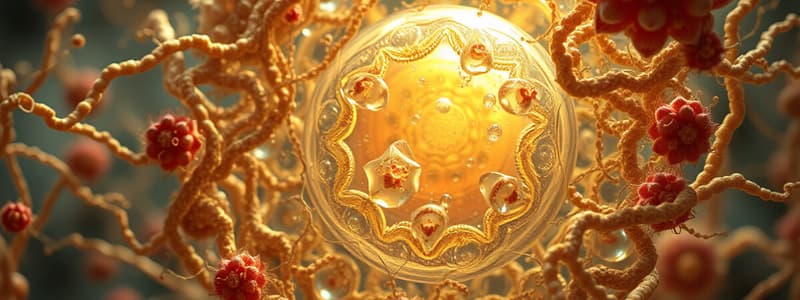Podcast
Questions and Answers
What does the suffix '-plasia' refer to?
What does the suffix '-plasia' refer to?
- Change in the structure of cells
- Development in the size of cells
- Formation, growth in the number of cells (correct)
- Lack of development of cells
What does the suffix '-trophy' refer to?
What does the suffix '-trophy' refer to?
- Development in the size of cells, tissue, or organs (correct)
- Poor formation of cells
- Abnormal increase in the number of cells
- Formation of cells
What does 'ana/plasia' mean?
What does 'ana/plasia' mean?
Change in the structure of cells and their orientation
What does 'a/plasia' indicate?
What does 'a/plasia' indicate?
Define 'dys/plasia'.
Define 'dys/plasia'.
What does 'hyper/plasia' mean?
What does 'hyper/plasia' mean?
What is 'neo/plasia'?
What is 'neo/plasia'?
What does 'dys/trophy' refer to?
What does 'dys/trophy' refer to?
What is indicated by 'a/trophy'?
What is indicated by 'a/trophy'?
Define 'hyper/trophy'.
Define 'hyper/trophy'.
Flashcards are hidden until you start studying
Study Notes
Cellular Growth and Development Terminology
- -plasia: Refers to formation or growth, particularly in the number of cells.
- -trophy: Indicates development in the size of cells, tissues, or organs.
Types of Cellular Changes
- ana/plasia: Describes changes in the structure and orientation of cells.
- a/plasia: Indicates a complete lack of cell formation.
- dys/plasia: Refers to abnormal or poor formation of cells.
Abnormal Cell Growth
- hyper/plasia: Represents an abnormal increase in cell numbers while maintaining normal arrangement.
- neo/plasia: Describes the new and abnormal accelerated formation of cells, often resulting in tumor formation.
Tissue and Organ Development Issues
- dys/trophy: Refers to poor or painful development of tissues or organs, commonly associated with muscle tissues.
- a/trophy: Indicates tissue wasting or lack of development, frequently related to muscle tissue.
- hyper/trophy: Relates to the overdevelopment in size of an organ.
Studying That Suits You
Use AI to generate personalized quizzes and flashcards to suit your learning preferences.



